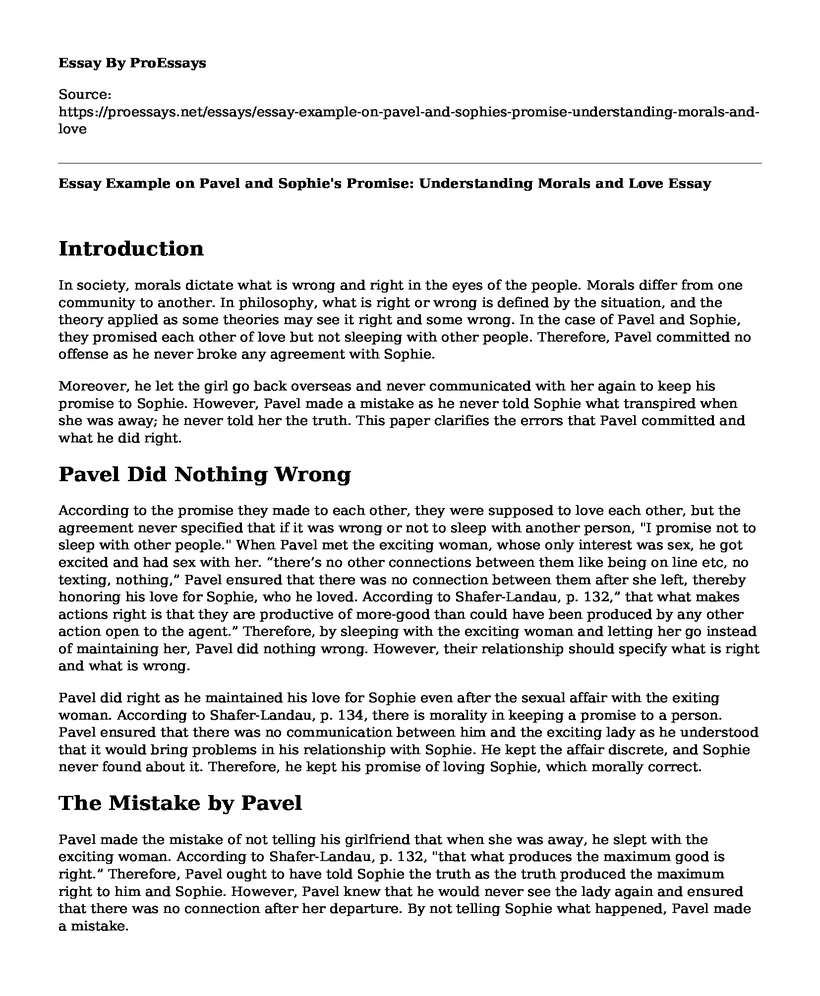Introduction
In society, morals dictate what is wrong and right in the eyes of the people. Morals differ from one community to another. In philosophy, what is right or wrong is defined by the situation, and the theory applied as some theories may see it right and some wrong. In the case of Pavel and Sophie, they promised each other of love but not sleeping with other people. Therefore, Pavel committed no offense as he never broke any agreement with Sophie.
Moreover, he let the girl go back overseas and never communicated with her again to keep his promise to Sophie. However, Pavel made a mistake as he never told Sophie what transpired when she was away; he never told her the truth. This paper clarifies the errors that Pavel committed and what he did right.
Pavel Did Nothing Wrong
According to the promise they made to each other, they were supposed to love each other, but the agreement never specified that if it was wrong or not to sleep with another person, "I promise not to sleep with other people." When Pavel met the exciting woman, whose only interest was sex, he got excited and had sex with her. “there’s no other connections between them like being on line etc, no texting, nothing,” Pavel ensured that there was no connection between them after she left, thereby honoring his love for Sophie, who he loved. According to Shafer-Landau, p. 132,” that what makes actions right is that they are productive of more-good than could have been produced by any other action open to the agent.” Therefore, by sleeping with the exciting woman and letting her go instead of maintaining her, Pavel did nothing wrong. However, their relationship should specify what is right and what is wrong.
Pavel did right as he maintained his love for Sophie even after the sexual affair with the exiting woman. According to Shafer-Landau, p. 134, there is morality in keeping a promise to a person. Pavel ensured that there was no communication between him and the exciting lady as he understood that it would bring problems in his relationship with Sophie. He kept the affair discrete, and Sophie never found about it. Therefore, he kept his promise of loving Sophie, which morally correct.
The Mistake by Pavel
Pavel made the mistake of not telling his girlfriend that when she was away, he slept with the exciting woman. According to Shafer-Landau, p. 132, "that what produces the maximum good is right.” Therefore, Pavel ought to have told Sophie the truth as the truth produced the maximum right to him and Sophie. However, Pavel knew that he would never see the lady again and ensured that there was no connection after her departure. By not telling Sophie what happened, Pavel made a mistake.
Conclusion
In different societies, the definition of right or wrong differs. In philosophy, the definition varies depending on the theory one is using and its application. In the case of Pavel and Sophie, Pavel did the right thing by keeping his promise to Sophie and ensuring that there was no communication between him and the exciting woman after her departure. However, Pavel was supposed to tell Sophie what happened to ensure that there was no secrecy in his relationship. The relationship between Pavel and Sophie should have clarity on what is wrong and what is right.
Works Cited
Shafer-Landau, Russ. The Ethical Life: Fundamental Readings in Ethics and Moral Problems. New York: Oxford University Press, 2012. Print.
Cite this page
Essay Example on Pavel and Sophie's Promise: Understanding Morals and Love. (2023, Aug 08). Retrieved from https://proessays.net/essays/essay-example-on-pavel-and-sophies-promise-understanding-morals-and-love
If you are the original author of this essay and no longer wish to have it published on the ProEssays website, please click below to request its removal:
- Lifespan Development: Adolescence
- Argumentative Essay on Freewill and Determinism
- Paper Example on Ethics and Persuasion
- Vocational Counseling Essay
- Essay Sample on Knowledge Competencies as the Emphasis on Organizational Growth and Approach
- The Debate on Happiness and Freedom: Which is More Important? - Essay Sample
- Analysis of Socrates Argument on Death - Essay Sample







